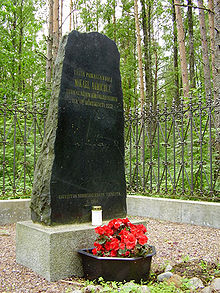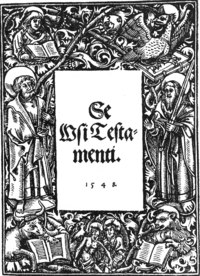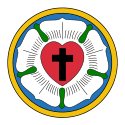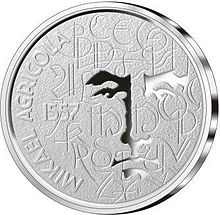- Mikael Agricola
-
Mikael Agricola 
Mikael AgricolaBorn c. 1510
Torsby, Pernå, Uusimaa (Nyland), FinlandDied 9 April 1557
KyrönniemiMikael Agricola (
 pronunciation (help·info)) (c. 1510 – 9 April 1557) was a clergyman who became the de facto founder of written Finnish and a prominent proponent of the Protestant Reformation in Sweden (including Finland). He is often called the "father of the Finnish written language". Agricola was consecrated as the bishop of Turku (Åbo) in 1554, without papal approval. As a result, he began a reform of the Finnish church (then a part of the Church of Sweden) along Lutheran lines. He translated the New Testament, the prayerbook, hymns, and the mass into Finnish, and through this work set the rules of orthography that are the basis of modern Finnish spelling. His thoroughgoing work is particularly remarkable in that he accomplished it in only three years. He died suddenly while returning from a trip during which he negotiated a treaty with the Russians.
pronunciation (help·info)) (c. 1510 – 9 April 1557) was a clergyman who became the de facto founder of written Finnish and a prominent proponent of the Protestant Reformation in Sweden (including Finland). He is often called the "father of the Finnish written language". Agricola was consecrated as the bishop of Turku (Åbo) in 1554, without papal approval. As a result, he began a reform of the Finnish church (then a part of the Church of Sweden) along Lutheran lines. He translated the New Testament, the prayerbook, hymns, and the mass into Finnish, and through this work set the rules of orthography that are the basis of modern Finnish spelling. His thoroughgoing work is particularly remarkable in that he accomplished it in only three years. He died suddenly while returning from a trip during which he negotiated a treaty with the Russians.Contents
Biography
Early life
Michael Olaui or Mikkel Olofsson (Finnish: Mikael Olavinpoika) was born in Uusimaa (Nyland) in the village of Torsby in Pernå, Finland, around the year 1510. He was named after the patron saint of Pernå's church. The exact date of his birth, like most details of his life, is unknown. His family was a quite wealthy peasant family according to the local bailiff's accounting. He had three sisters, but their names are not known. His teachers apparently recognized his aptitude for languages and his rector Bartholomeus sent him to Viborg (Viipuri) for Latin school and some priestly training, where he attended the school of Erasmus. It is not known whether his first language was Swedish or Finnish - the first alternative is supported by the fact that Pernå was mostly a Swedish-speaking district. However, he mastered both languages like a native speaker and was possibly a bilingual child.
Agricola as a student
When he studied in Viborg (Viipuri) he assumed the surname Agricola ("farmer" gv. "agriculture"); surnames based on one's father’s status and occupation were common for first-generation scholars at the time. It was probably in Viipuri where he first came in touch with the Reformation and Humanism. The Viipuri castle was ruled by a German count, Johann, who had served the king of Sweden, Gustav Vasa. The count was a supporter of the Reformation, and they already held Lutheran services.
In 1528 he followed his teacher to Turku (Åbo), the center of the Finnish side of the Swedish realm and the capital of the bishopric, where he became a scribe in bishop Martinus Skytte's office. While in Turku he met Martin Luther's first Finnish student Petrus Särkilahti, who eagerly spread the idea of the Reformation. Särkilahti died in 1529, and it was up to Agricola to continue his work. He was ordained for priesthood circa 1531.
In 1536 the bishop of Turku sent him to study in Wittenberg in Germany. He concentrated on the lectures of Philipp Melanchthon, who was an expert in Greek, the original language of the New Testament. In Wittenberg he studied under Luther.[1] He got recommendations to Gustav Vasa from both of the reformists. He sent two letters to Gustav, asking for a confirmation for a stipend. When the confirmation came, he bought books (for example, the complete works of Aristotle). In 1537 he started translating the New Testament into Finnish.
Agricola as a rector and an ordinarius
In 1539 Agricola returned to Turku and ended up as the rector of Turku (Cathedral) School. He did not like his job, calling his students "untamed animals". At the time Gustav Vasa had confiscated the property of the church when he was consolidating his power but also drove the Reformation. In 1544 Agricola received an order from the crown to send several talented young men to Stockholm's taxing offices. For some reason, Agricola did not obey until the order was sent again the next year, with a more menacing tone. This episode probably affected their relations negatively.
In 1546 Agricola lost his home and school in the Fire of Turku. On 22 February 1548 Gustav Vasa ordered Agricola to retire from his position as a rector. At this time he was already married, but history knows his wife only by her name: Pirjo Olavintytär (Bridget, "daughter of Olavi"; Birgitta Olafsdotter, Brigida Olaui). His only son, Christian Agricola (Christianus Michaelis Agricola), was born 11 December 1550, and became the bishop of Tallinn in 1584.
 Monument on the place of Mikael Agricola's death near Primorsk
Monument on the place of Mikael Agricola's death near Primorsk
When an old bishop died in 1554, Gustav Vasa had Agricola consecrated as the ordinarius of Turku parish – for all practical purposes Bishop of Turku and by extension the first Lutheran bishop for all Finland. He was not particularly virulent in reform, although he did remove the Canon of the Mass.
In 1557 he joined the delegation that was going to Russia and was in Moscow from 21 February to 24 March negotiating a peace treaty, the Treaty of Novgorod (1557). On 9 April he fell ill and died in the Uusikirkko (now Polyane) village, part of the Kyrönniemi parish on the Karelian Isthmus.[2] This day is also Elias Lönnrot's birthday and it is celebrated in Finland as the day of the Finnish language. He was buried inside Viipuri's church, but the exact location of the grave is not known.
He is commemorated as a bishop by the Evangelical Lutheran Church in America on 10 April.
Literary achievements
Abckiria
Main article: AbckiriaAgricola had thought about translating the New Testament in his early years of study. At the time, however, there was no standard written form of Finnish. He started developing it. His first book, "Abckiria", which is nowadays known as the "ABC-kirja" or ABC-book, was a primer for reading and a catechism. It was first printed in 1543. The catechism was included because only a very few people could afford the whole Bible at the time. The first printing contained 16 pages. A second printing was released in 1551 with 24 pages.
Rucouskiria
Agricola's Rucouskiria (Rukouskirja-prayer book) was printed in March 1544. At the beginning of the book, Agricola wrote about many topics concerning all-round education and the Reformation's effects in Finland. The book includes four prefaces and about 700 prayers on many topics; it even has twelve different prayers instead of the usual two or three. It is the most independent work by Agricola and contains approximately 900 pages. His sources include the works of Luther, Melanchthon, and Erasmus.
 Cover of Se Wsi Testamenti, or the New Testament
Cover of Se Wsi Testamenti, or the New Testament
Se Wsi Testamenti (the New Testament- Uusi testamentti)
Main article: Se Wsi TestamentiAgricola's most prominent book is Se Wsi Testamenti, the first Finnish-language translation of the New Testament. The manuscript was completed in 1548. It contains 718 pages and many illustrations.
Three Liturgical books
While Agricola was in Wittenberg, he translated three smaller liturgical books into Finnish. These books were printed in 1549.
Käsikirja Castesta ia muista Christikunnan Menoista includes forms for christening, marriage and burial, as well as speeches for the sick, mourning and dying. It is translated from Olaus Petri's corresponding work except for the christening and marriage portions, which are from Luther. It also contains minor elements translated from Caspar Huberinus' works.
Messu eli Herran echtolinen includes the form for a service. It is also based on Olaus Petri's work and a few Finnish manuscripts. In this book Agricola revealed his next mission: the translation of the Old Testament.
Se meiden Herran Jesusen Christusen Pina, ylesnousemus ia tauiaisen Astumus, niste Neliest Euangelisterist coghottuon tells about Jesus Christ's suffering. It is collected from all four gospels. This book was influenced heavily by Johannes Bugenhagen, a teacher in Wittenberg. It was mainly translated from the German version, but some parts are influenced by the Swedish version and Agricola's own translation of the New Testament.
Commemorations of Agricola
Mikael Agricola was recently selected as the main motif for a commemorative coin, the €10 Mikael Agricola and Finnish language commemorative coin, minted in 2007. This collector coin was issued to honor Mikael Agricola's lifework as a contributor to Protestant reformation in Finland and as the father of the Finnish written language. The reverse of the coin shows a quill referencing the writer; while the obverse side contains an artistic interpretation of a human figure.
References
- ^ Lutheran Cyclopedia entry on Agricola, Michael.
- ^ Heininen, Simo; Heikkilä, Markku (2002) (in German). Kirchengeschichte Finnlands. Vandenhoeck & Ruprecht. p. 70. ISBN 3525554443.
External links
- Evangelical Lutheran Church of Finland - Official site
- Agricola 2007 -juhlavuosi
Categories:- 1510s births
- 1557 deaths
- People from Loviisa
- Finnish translators
- Translators of the Bible into Finnish
- Christianity in Finland
- Church of Finland
- Finnish Lutheran clergy
- Finnish bishops
- Archbishops and bishops of Turku
- Finnish scientists
- Finnish writers
- Lutheran bishops
- 16th-century bishops
- 16th-century Finnish people
- People celebrated in the Lutheran liturgical calendar
- Protestant Reformers
- Renaissance humanists
- 16th-century Protestant Reformers and ministers
- 16th-century Lutheran bishops
Wikimedia Foundation. 2010.


